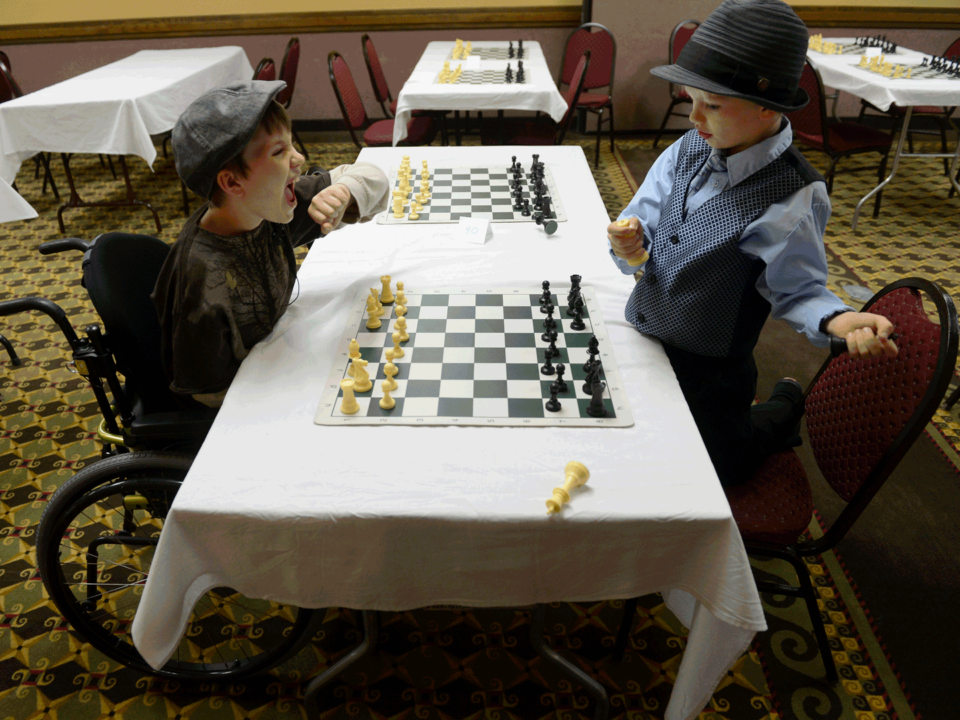Throughout his 13-year chess career, Griffin McConnell of Golden has rarely seen players with disabilities at tournaments. He can understand why, because each time he enters a tournament he has to go through a process contacting the director and negotiating accommodations for his disability, an immoble arm.
The fix is a pretty simple bending of regulations: making sure the time clock is on his left side rather than the right. “There was only one tournament ever that actually accommodated my needs every single time,” Griffin says. So, Griffin, with financial help from ChessKid (a website where kids learn and play chess) and support from his parents, Kevin and Kori McConnell, planned to host a new tournament.
The first North American Chess Cup for Children with Disabilities will be held near the Denver Tech Center June 21 to 26. This event is complete with aids to accommodate neurodiverse and physically disabled players so that, according to Griffin, players don’t feel stranded, and feel like they can, in fact, play chess.
Making the Opening Move
Griffin started playing at age four with his dad, Kevin, and younger brother, Sullivan. He started entering youth Scholastic tournaments a year later, about the same time he was diagnosed with epilepsy. Rounds of various medications didn’t help; but Griffin’s chess game kept getting better—he and Sullivan got a coach and competed at state and national tournaments. Finally, when he was eight years old, Griffin underwent a hemispherectomy (disconnecting the two sides of the brain). He couldn’t talk or walk much at first, but the surgery made his seizures stop. In six months he started playing in tournaments again and was doing well.
From then on, Griffin and Sullivan, accompanied by Kevin, traveled to competitions about once per month. By age eight and nine, they were regularly beating adults ages 30 to 50. It wasn’t until Griffin entered his freshman year of high school that he started to notice something was off again. Tiny seizures had come back, mixing with his chronic headaches. This affected his ability to think clearly during chess, souring his favorite pastime. Griffin elected to get another surgery—the removal of his left brain hemisphere. Again, it took six months to return to his base cognitive functioning, but he quickly made up ground in his chess game. Just a year after the operation, in March 2022, he made it to the National Master ranking
“It was shocking,” Griffin says. “It made me feel like I made the right decision, like all that hard work for years was worth it. I feel more confident with my chess than before.”
Capturing New Players
Though he’s accomplished much in “typical” tournaments, Griffin believes a disability-inclusive competition would ensure more folks would feel welcome in the sport. He looks to the International Chess Federation World Championship for People with Disabilities, and one of its biggest advocates Thomas Luther, as inspiration. The U.S. Chess Federation doesn’t hold separate tournaments, according to Kevin, who was the vice president of Colorado State Chess Association for a few years, because they don’t want to make a separate-but-equal situation. But there’s also little investment in accommodations to make tournaments accessible because there isn’t much extra money—most registration and membership fees go to venue rentals.
What the McConnells are trying to do with their tournament in June is find out what players’ specific needs are and how to accommodate them so that all rated chess tournaments can offer parity for all participants. If they can fundraise and make it happen here in Denver, they can possibly inform and convince the whole community to follow suit, so more kids and adults with disabilities start playing chess and sticking with it.
A Unique Tournament for Kids
The North American Chess Cup for Children with Disabilities is open to players grades Kindergarten through 12 of all skill levels. It’s a non-elimination tournament, meaning each player can participate in all seven rounds. There will be American Sign Language interpretation for players who are deaf and hard of hearing. Talking clocks will help vision impaired players keep track of their time, and pegged chess boards will help them feel about the board to identify possible moves. Players are welcome to wear noise-cancelling headphones (which is true at other regulation tournaments).
Many folks who have signed up so far are beginners, says Kevin, they’ll benefit from volunteers who will offer game analysis, so kids can learn from their best moves and mistakes. Two female chess grandmasters, ranked numbers seven and three in the nation, will also run a free camp for kids and parents during two of the morning sessions. Participants will participate in a complimentary field trip to the Denver Museum of Nature & Science, with a pizza party and performance from disabled actors and singers representing Phamaly Theatre Company to follow. To top things off, college scholarships—$2500 to the open section winner, $1500 to the high school winner, and $1000 to the middle school winner—are on the table.
In coming years, if they’re fortunate to raise enough money and secure funding from ChessKid again, the McConnells would like to include travel stipends for folks coming from out of state. They understand how expensive it can be to make it to multi-day tournaments and have to pay for lodging and food, not to mention extra care for a disability along the way.
“The more we can grow [the tournament], the more we can send back information to the state associations about what they need to do to accommodate these players,” Kevin says. “When players know they can demand those accommodations, we can make change; at least that’s the hope.”
Need to Know:
Register for the North American Chess Cup for Children with Disabilities by June 7; $110 entry fee. The tournament will be held in a ballroom at the Embassy Suites Denver Tech Center North off East Hampden Avenue.





